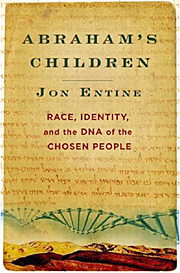Jon Entine considers himself “a practicing Jewish atheist.”
His rather unconventional views, as well as his passion for his Jewish heritage, suffuse his new book, Abraham’s Children: Race, Identity and the DNA of the Chosen People (Grand Central Publishing, 2007).
“My Jewish heritage is very important to me and I have an incredible love for Judaism,” says Entine, an adjunct fellow at the American Enterprise Institute in Washington, D.C. Entine is a consultant on the media and business ethics, and has written four books, including Taboo: Why Black Athletes Dominate Sports and Why We’re Afraid to Talk about It. He also is a columnist for Ethical Corporation magazine.
As someone who considers himself to be both an atheist and a Jew, the author says he realizes his ideas may be “discordant” to many Jews, “but to me, Judaism has many threads.” Entine says he has never had a rabbi demand that he change his views so that they correspond with those of the rabbi.
“It’s open as long as we match the basic ethical requirements of what it means to be Jewish,” he says.
Unlike Christianity or Islam, which he describes as “faith-based,” Judaism is much more complex — a “tribal religion tied to nationhood” — encompassing peoplehood, land and ancestors, as well as faith.
He wanted to explore that complexity with his book, he says.
Entine decided to write Abraham’s Children following a family tragedy.
Born in Philadelphia in 1952 into a family of “High Holiday Jews,” he became Bar Mitzvah and was confirmed at the family Reform synagogue. Nevertheless, he says, he never believed in God, though always considering himself a Jew.
His mother died of ovarian cancer when he was 17, and that reaffirmed in his mind that there was no God. (“If there were a God, he wouldn’t have let this happen,” he remembers thinking.)
Even so, Entine says he was fascinated by religion, which he studied — along with philosophy — at Trinity College in Hartford, Conn., graduating in 1974.
After a stint working for Father Robert Drinan, the Catholic priest who was a Democratic member of Congress representing Massachusetts in the 1970s, Entine spent the next 20 years as a writer and producer for ABC and NBC television.
In Taboo, he had written about genetics. After it was published, the author learned that his sister had been diagnosed with breast cancer — “a rapidly spreading kind” similar to the disease that had killed his mother as well as his grandmother and aunt.
Tests showed that his sister had a genetic mutation, common in Jews, that almost surely had caused her cancer — and probably had that of his other relatives as well. This “tragic marker of our family’s Jewish ancestry” rekindled his interest in Judaism and led to the book, he says.
Among the issues that Entine deals with in his book — an amalgam of history and genetics — is the classic conundrum “Who is a Jew?” How, for example, should the Jewish people relate to Father William Sanchez, a practicing Catholic whose genetic make-up shows that his family was at one time Jewish? Or the Falashas of Ethiopia, who are practicing Jews with no apparent genetic connection to the Jewish people? Or the Lemba tribe in southern Africa, some of whose members apparently are Semitic in origin? Or, for that matter, people like the author, who consider themselves atheists?
DNA is a “problematic way to establish identity,” he writes. “Despite the understandable excitement that comes with exploring our genetic attic, there is a clear danger in granting far too much explanatory power to the genes. Religion, culture, social groups, and legal associations all play a role in defining identity.”
In other words, genes help to illuminate individuals’ backgrounds, but cannot, by themselves, determine who is a member of the tribe.
Who is a Jew?
